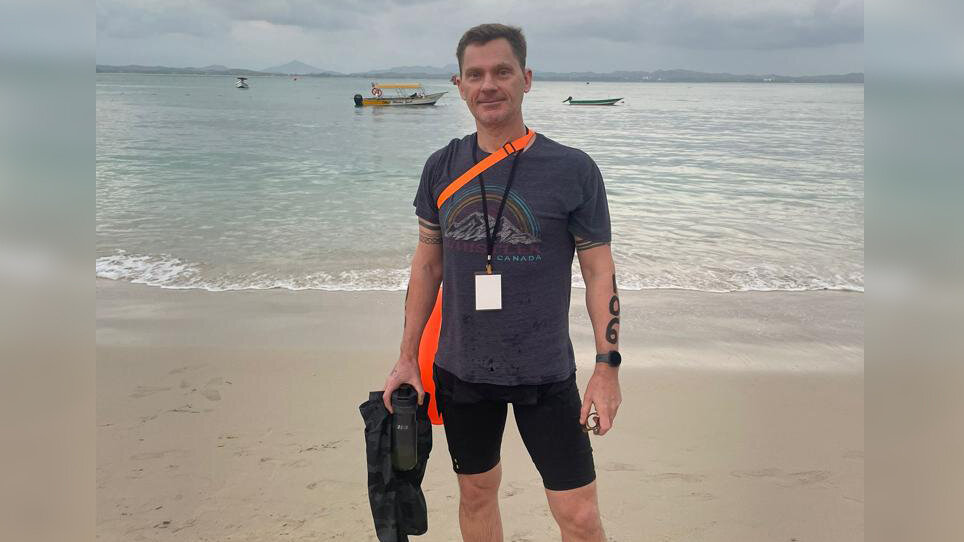
"Open water swimming and being autistic both have that sense of the world around you being unpredictable and a bit chaotic. The test is how you navigate that and start to build coping mechanisms.”
Eric
- on raising autism awareness through his open water swimming challenges.
In this Stories from the Spectrum, we meet fundraiser Eric, who’s taking on open water swimming challenges to raise £50,000 for our charity. Eric reflects on the process of his late diagnosis, spreading awareness and he shares his thoughts on comparing open water swimming to autism.
When did you first know or start to think you were autistic?
I guess the right way to describe it is that there were a handful of life challenges, frustrations or experiences that I was trying to deal with, which were frankly large mysteries to me. I had never been officially diagnosed but it just seemed to be this kind of big, inexplicable elephant in the room.
When I look back, I did question myself. Why did I do that? Why did I think that way? Why did I react like that? You spend your life beating yourself up. It must have been around the time my son (who’s now 13) got his formal diagnosis, that I started recognising some of my own character traits, issues and challenges that we were learning about. A few years later my wife and I decided that I should be formally assessed. We agreed that it’s better knowing what you're dealing with.
What was the process like getting your diagnosis?
My formal assessment took place last year, through a private practice in the UK. I was 49 years old. It was a face-to-face session for multiple hours and very thorough. During the session we scraped open some old wounds and I re-lived some of the things that I had compartmentalised, but I feel lucky because the private practice group were incredibly patient.
I have spent over four decades trying to understand things about myself and my shortcomings that, frankly, I never got any good answers for. This was the first time that somebody had said there were not only possible but plausible explanations.
If you talk to many autistic people, they'll tell you that they feel they’ve spent their lives trying to navigate the world without the guide that everybody else seems to have. It all changed after my assessment and I thought “maybe there is a playbook that works for me”.
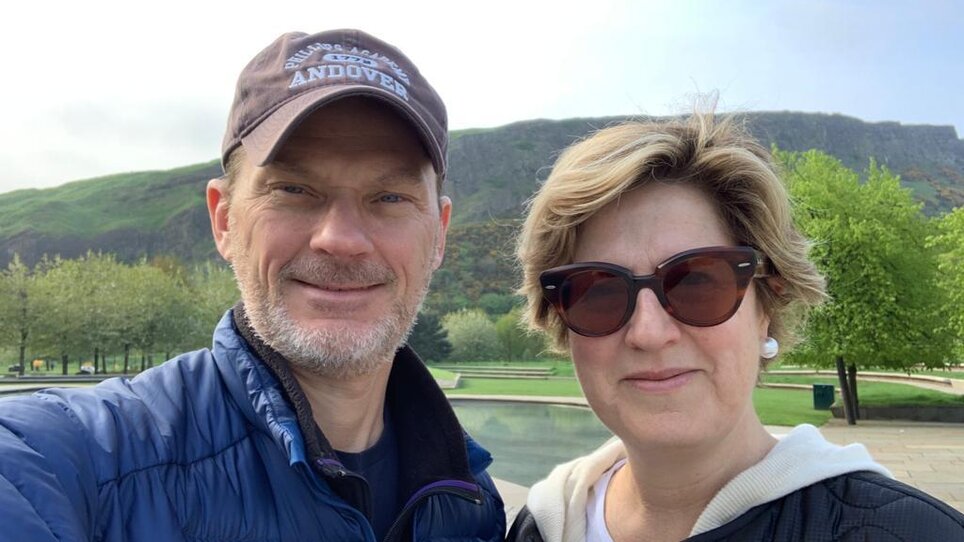
“When the results came back, it was a huge relief; I came through it feeling like I finally had a road map. It was incredibly liberating.”
What impact has your diagnosis had on your life?
The knowledge I’ve gained has been an incredible relief and I’ve learnt a lot about myself. The notion of autistic burnout is really debilitating and if you understand the triggers and repercussions, you can build up your defences or resilience. My diagnosis has given me a set of tools that I never had before.
Neurodivergent or neurotypical, everybody has challenges in life; but it’s when you understand what you're working with, that you can start to build on it. I'm an incredibly private person but this has been an eye-opening experience and has made me want to be much more public and vocal about autism.
The external world can have unpredictable effects on autistic people, things which a neurotypical person would say are minor; like temperature change, loud noises or an unexpected change in schedule. These experiences can derail an autistic person and make it look like they're incompetent or that they’re not able to function in a ‘normal’ environment.
A big part of awareness for me is highlighting that the ways autistic people react are typically as a result of triggers or the situation they’re in, not necessarily a function of the person themselves.
What inspired you to start campaigning?
I started thinking about what I could do to raise awareness and what would be meaningful, not only to my son, but to the community and parents and caregivers who are experiencing this.
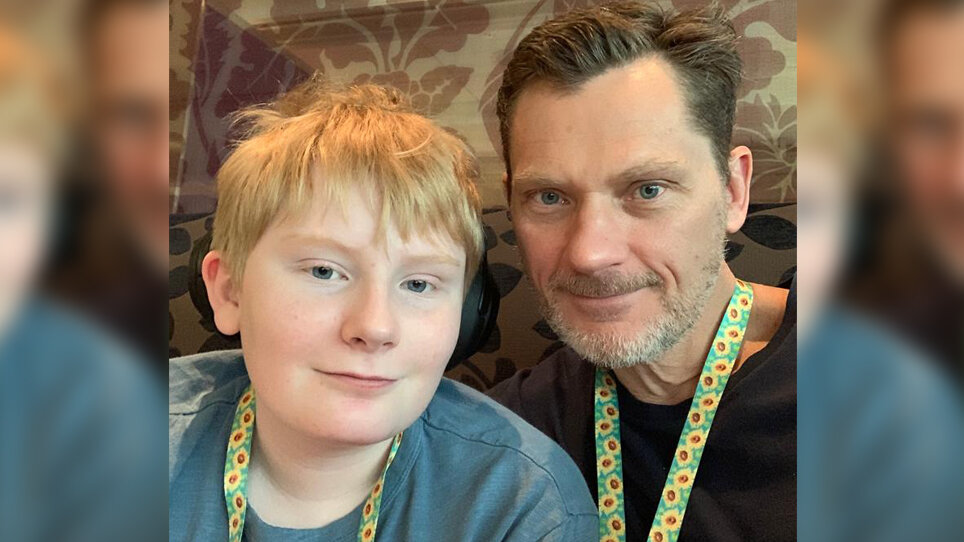
“I was tired of feeling like our family were always on the defensive, fighting all the time to get more information and fighting to learn. I wanted to convince myself, and my son, about the value of being your own best advocate.”
Getting people to normalise a conversation about autism is important, so let's just get it out in the open and talk about it.
Tell us about Swimfree 2023?
There are a series of open water endurance races around the world that involve long distances and are subject to the whims of Mother Nature, like jellyfish and current.
Malaysia 🏊 - In March I completed a race that was a 6.5 kilometre swim from an island out in the ocean back to the mainland. There were pretty significant swells out in the ocean, so you couldn’t see land, other swimmers or even the safety buoys. I didn't know if I was swimming to the coastline of Malaysia or Thailand, I just had to trust my knowledge and internal GPS.
Italy 🏊 – I finished a race in Italy in June. It was more forgiving than the Malaysian one, because it was in a lake, but I learned afterwards that I had Covid, so it had challenges of a different kind.
Norway 🏊 – Next up is Norway in August. This one is in the ocean and is a combination of swimming and trekking up and down the fiords.
Dubai 🏊 – In November, my final challenge will be a 10 kilometre swim.
What do you enjoy most about open water swimming, and what do you find most challenging?
What appeals to me is the fact that the open ocean is an unpredictable place. I’ve always been an active person, but this is next level. There are the obvious physical and mental tests, but also the interesting comparisons to being autistic and its challenges.
“Open water swimming racing is chaos. It’s getting into an ocean or a lake with a couple of hundred other people. At the start, people are literally swimming over each other, kicking each other… It is utter chaos. The idea of getting into a pool where everybody swims orderly in their lane, is out the window. I thought this was the perfect analogy for being autistic, that sense of the outside world being chaotic and how do you navigate that?”
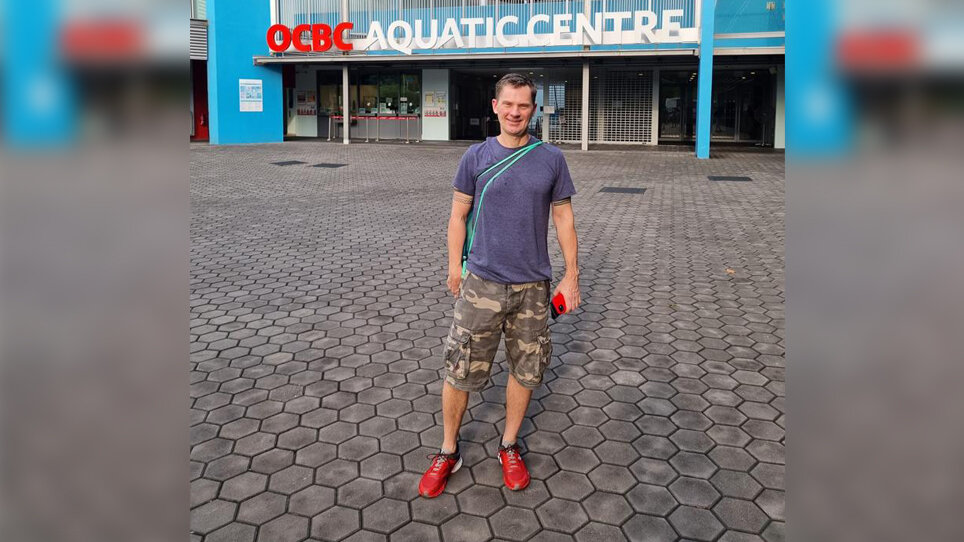
I love the fact that it's a solo sport, but you're also surrounded by other people. You can compete with others or you can compete with yourself; all with the backdrop of human versus Mother Nature.
What I have found challenging is that, no matter how much you train and prepare, on the day of the race, you just don't know what you're going to get. If you think about it, for an autistic person that's not a good recipe!
Open water swimming is a meaningful challenge to me because it cuts against everything I try to do in controlling my life. With this, you have to surrender that control and trust that the work you've done will get you through it.
What’s it been like running a fundraising campaign?
I've never done anything like this before, so I probably spent a month just writing ideas on paper. I'm not very good at social media, so I had to learn that too!
The most important thing to me was to raise awareness, so I knew I had to do something over a period of time rather than a one-time event. My campaign had to captivate people's attention and spark interest in not only autism awareness, but the campaign itself.
I've never swum more than about 500 metres, so ‘long distance swim racing’ was completely foreign to me. I wanted to do something that was physically tough and make people think “You’re nuts, you can’t possibly be serious”.
I chose this specific open water swimming campaign because the symbolism with autism resonates with me and I wanted to give the audience an opportunity to see my ups and downs.
You are Global Head of Research at an international bank. Do you think being autistic has helped?
It probably has, but it’s also been a hindrance at times. I have made many mistakes in my life that were the function of behaviour that I just didn't understand, because I am wired differently.
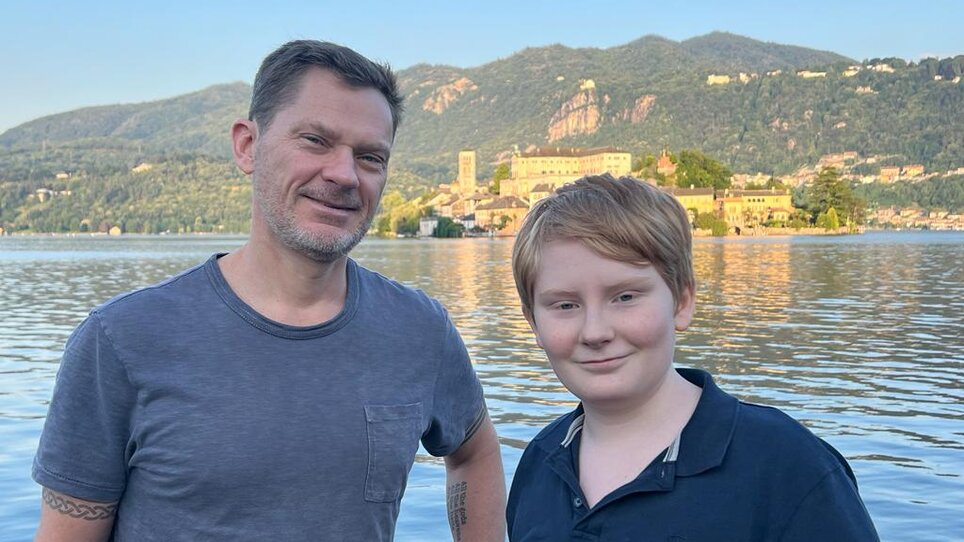
“Autism is not a disorder; it is being differently ordered!”
So, when I walk into the office and I literally forget to say hello to somebody and walk right past them, it's nothing personal, it’s just sometimes my mechanism doesn't kick in and I forget social rules. Autism is really about a different kind of wiring.
Since my diagnosis, I’ve become better at accentuating my strengths and acknowledging my weaknesses at work. It may be cliched to say that autism has given me a compulsive need to get to the bottom of things… but it is true to some degree. As I get older, I’m able to angle my strengths, so they dominate what I'm doing as opposed to being tripped up by my weaknesses. It certainly has been a roller coaster!
Follow Eric on Instagram: @swimfree2023
Fundraise on Eric's JustGiving page here
